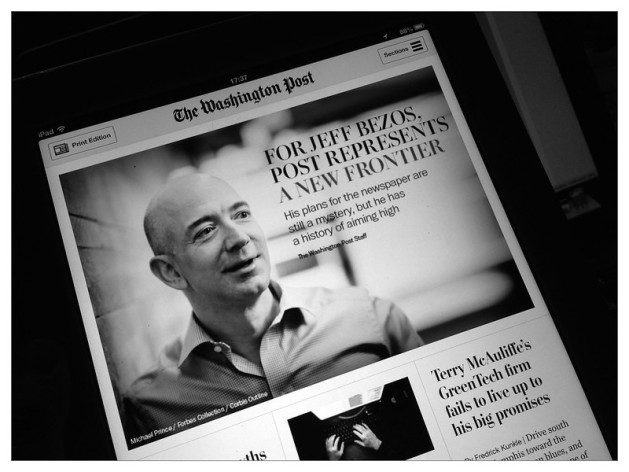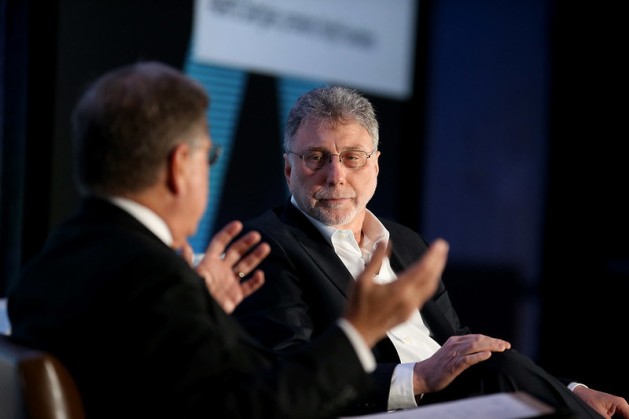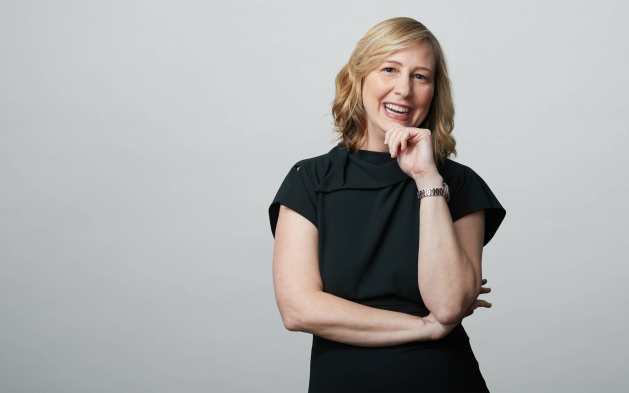
Photo (cc) 2013 by Esther Vargas
Previously published at GBH News.
Sunday was Marty Baron’s last day as executive editor of The Washington Post. The legendary editor, along with the Post’s deep-pockets owner, Jeff Bezos, is widely credited with reviving the paper and restoring its status as one of the pre-eminent American newspapers. Five years ago GBH News contributor Dan Kennedy interviewed Baron for his book “The Return Of The Moguls: How Jeff Bezos And John Henry Are Remaking Newspapers For The Twenty-First Century.” An excerpt from the book follows.
When I interviewed Marty Baron in March 2016, his office at The Washington Post’s new headquarters was smaller than I had expected. We sat at a conference table next to a human-sized cardboard cutout of an Oscar statuette, which he said was waiting for him after he returned from the Academy Awards gala in Hollywood.
The Oscar was for “Spotlight,” based on The Boston Globe’s Pulitzer-winning investigation into the pedophile-priest crisis within the Catholic Church — the story that defined Baron’s years as editor of the Globe. He also showed me a small chocolate Oscar he’d brought home. Soft-spoken and businesslike, with graying reddish hair and a closely trimmed beard, Baron talked for an hour about life at the Post under Jeff Bezos.
“I was completely shocked, obviously,” Baron said when I asked him about his reaction to the news that Bezos would buy the Post. “I told people when I came here that while the Times would probably like to sell the Globe, it was highly unlikely that Don Graham would be selling The Washington Post. So I was kind of stunned when I heard about it. But I thought that it could have some real advantages for us” — a reference to Bezos’s preference for growth over cutting and his deep understanding of technology and consumer behavior.
“I did not know if it would be a good thing for me personally,” Baron added, “because obviously when a new owner comes in he has the absolute right to pick who he wants to run the organization that he has acquired. He said positive things at the beginning, but my sense was that it would be a year of figuring out the place and deciding what he wanted to do.”
Even though Bezos bought a $23 million mansion in Washington, D.C., in late 2016, he spends most of his time on the West Coast. For the most part he manages his newspaper from afar, presiding over an hour-long conference call with the Post’s top executives every other week.
“It starts on time, ends on time; it’s very disciplined,” Baron said. “He gets all of the material in advance. We don’t use it to go through presentations. We use it to review any questions that he might have or to embark on any broader discussions. But typically all of the material is sent to him in advance in a narrative style, not PowerPoints. He doesn’t like PowerPoints, thankfully. He typically has some questions, and those questions become a springboard to discussion of whatever we need to talk about.” The Post’s leadership also travels to Seattle twice a year for a day of meetings. Baron said those meetings run from around noon to 6 p.m., followed by dinner.
I also asked Baron how the Post had been able to amass as large a digital audience as The New York Times — between 80 and 100 million monthly unique visitors at that time — despite a staff that was about half the size. His answer was two-fold. First, he said that the Post was not competing with the Times so much as it was competing for people’s attention, whether it be against The Huffington Post, BuzzFeed, Politico or Vox. Second, he said the Post is “doing things that are much more attuned to the digital environment” by “treating the web as a distinct medium.”
Among the examples Baron cited: hiring young digital-native journalists who write with a distinctive voice and who are unconcerned as to whether their stories appear in print or are only posted online; embracing multimedia tools such as video, the publication of original documents and annotation — debate transcripts, for instance, have been marked up with highlighted comments by Post journalists, adding context and occasional snark; and writing engaging headlines that are not constrained by the artificial confines of column width, as are print headlines.
“I mean, look, radio is different from newspapers, television is different from radio,” Baron said. “Here comes the web. We should be different, and mobile might be different, too.”
Now, I would argue that the Times’ approach to digital, although different from the Post’s, is every bit as engaging and innovative. But in discussing the Post’s rapidly growing digital audience, there’s an additional topic that can’t be avoided: its reliance on a presentation for some types of material that are aimed at maximizing shares and eyeballs.
Baron doesn’t like the term “clickbait,” and I agree with him that that’s not quite the right word. After all, “clickbait” suggests that the underlying story does not live up to the promise of the headline, and that’s rarely the case with Post journalism. But the Washington Post experience can vary quite a bit depending on how you access that journalism. The print paper mixes heavy and light fare, the serious and the entertaining, in a way that isn’t much different from what news consumers are used to. The website and the apps, though, often take a more viral approach.
That’s especially true with the national digital edition — the magazine-like app for mobile and tablet that debuted on Amazon’s Kindle Fire and later migrated to other platforms. For one thing, it omits local news so that its low cost won’t lure Washington-area readers into switching from their more expensive print or digital subscription. For another, the story mix and the presentation often have a viral feel to them. For instance, as I perused the national app on my iPhone on a Wednesday afternoon in April 2016, I saw stories like “O Cannabis! Canada Moves To Legalize Marijuana in 2017,” illustrated with a pot-festooned Canadian flag; “What Your First Name Says About Your Politics”; and “Diet Coke Is Getting A New Look.”
To be fair, these stories were well-reported and were interspersed amid more serious news. If I were riding on the subway and looking for something to read, I would have clicked on any of them. And there is nothing wrong with lightening things up as long as the core mission remains in place.
Longtime media critic and Post-watcher Jack Shafer, now with Politico, told me that he’s an admirer of Baron’s Post.
“It’s as good as it’s ever been,” he said. “In terms of accuracy, accountability, imagination, Marty Baron is a genius and an inspirational editor.” As for what Shafer forthrightly called “click-baitery,” he said it was no different from the days when newspaper editors would drop in a “Ripley’s Believe It Or Not” brief to fill a hole on a page. The idea, he said, is to make the Post a “habit.”
“You’re sitting there, you’re bored, or you’re angry at your editor, and you just want a media moment,” Shafer said. “It turns out that there’s a much larger market for that than we ever imagined.”
Baron put it this way: “Being viral doesn’t mean clickbait, and writing a headline and using a photo that would cause somebody to share something on a serious subject doesn’t make it clickbait. We do write headlines that we think will lead to sharing, and in many ways they get to the point a lot better. They actually explain the story better than traditional newspaper headlines. I mean newspaper headlines are terrible, right? They all have to be constrained within column sizes, so if you have a one-column head it’s all headline-ese. People don’t speak in headline-ese. The web and our apps allow us to write in a way that people speak.”
Post media blogger Erik Wemple, a veteran print journalist — among other career stops, he was the editor and media columnist at the alt-weekly Washington City Paper — told me that he was untroubled to be a newspaper columnist whose work rarely appeared in the newspaper. “All of the messaging and the emphasis seems to be on digital,” he said, adding that when he looked at the print paper, he often found it stale, as he saw stories that had appeared online a day or two earlier. “There’s a clear focus on digital work here,” he said. “That’s what the feedback loop bears, and that’s what drives conversation.”
***
One subject that often arises when asking about Jeff Bezos and The Washington Post is whether it can cover Amazon independently and impartially. Of course, it’s not unusual for a news organization to have an owner with outside interests that deserve coverage, with John Henry’s ownership of the Globe and the Red Sox being a prime example. But Amazon represents a particular challenge given its size, influence and cultural impact. Amazon, after all, is largely responsible for disrupting the book industry. Amazon Web Services does business with the CIA.
When Bezos met with Post staff members a month after he announced he would buy the paper, he told them that they should “feel free to cover Amazon anyway you want, feel free to cover Jeff Bezos any way you want.” By the spring of 2017, there were no reports that Bezos had tried to interfere with the Post’s news coverage.
Indeed, within days of the announcement that he would buy the paper, the Post published an in-depth examination of Bezos and Amazon that could fairly be described as warts and all — he was described as “ruthless” and a “bully” in his dealings with competitors and a boss who was known for launching “tirades” that “humiliated colleagues.”
As is his custom, Bezos refused to cooperate with the team of reporters who worked on that story. But national investigative editor Kimberly Kindy, who was among those journalists, told me there were no repercussions from Bezos after publication. “I don’t think that we have shied away from covering him. And he certainly has invited us to,” she said. Kindy’s Post career thrived under Bezos’s ownership. Among other things, she was deeply involved in a massive effort to document fatal shootings of civilians by police officers — a project that won the 2016 Pulitzer Prize for National Reporting.
Yet it was The New York Times, and not The Washington Post, that produced a lengthy, highly critical investigative story about Amazon’s workplace culture — a story that created a sensation when it was published in the summer of 2015. For anyone who had read Brad Stone’s 2013 book about Amazon, “The Everything Store,” there was little new information. Indeed, it struck me that the Times, unlike Stone, missed some crucial context in its implication that Amazon was uniquely awful rather than merely awful in the manner that’s typical of hard-charging technology companies. As the technology writer Mathew Ingram put it in criticizing the Times’ reporting, “To take just one example, Apple co-founder Steve Jobs’ treatment of his staff makes anything that Amazon has done (or likely ever will do) seem like a day at the beach.”
Regardless of the merits of the Times’ story, though, it may be too much to expect that the Post, of all media outlets, would take the lead on in-depth enterprise reporting about the dark side of Amazon. “To expect a newspaper to be a fifth column against itself and its owners is naive and probably without precedent,” Jack Shafer said.
Erik Wemple, on the other hand, said he hoped the Post could engage in such reporting if it was warranted. “It would be incredibly awkward to commission a big investigative story. And I hope we do endure that awkwardness,” Wemple said. “Bezos’s dream of a paper of record necessitates tough coverage of Amazon.” He added: “The difficulty is always one of self-censorship. That’s a serious concern of any news organization that has a mogul running it.”
Baron, for his part, said he had no intention of letting Bezos’s ownership of the Post interfere with the way his journalists covered Amazon. “Jeff said at his first town hall here, ‘You should cover me and cover Amazon the way you would cover any other company and any other chief executive, and I’m fine with that,’” Baron said. “On multiple occasions since then he has repeated that. He said the same thing to me personally. And I said, ‘Good, because that’s what I’m planning to do.’ And I have never heard from him about a single story about Amazon.”
***
In his early days at The Boston Globe, Baron kept an exceedingly low profile. As the news business shrank, Baron slowly began to emerge as a voice for embracing change while at the same time maintaining high journalistic standards. In 2012, when he was still at the Globe, he gave a speech in which he urged journalists to fight against the “fear” that had overcome them — fear of being accused of bias, of losing customers or offending advertisers: “Fear, in short, that our weakened financial condition will be made weaker because we did something strong and right, because we simply told the truth and told it straight.”
Baron’s public persona has only become more prominent since the release of the movie “Spotlight.” After the stunning victory of Donald Trump in the 2016 presidential campaign, marked by unprecedented attacks by Trump on the media, and especially on Jeff Bezos and the Post, Baron made use of his public platform to call for tough, independent coverage of the incoming president.
“If we fail to pursue the truth and to tell it unflinchingly — because we’re fearful that we’ll be unpopular, or because powerful interests (including the White House and the Congress) will assail us, or because we worry about financial repercussions to advertising or subscriptions — the public will not forgive us,” Baron said in accepting an award named for the late iconoclastic journalist Christopher Hitchens. “Nor, in my view, should they.”
Some months earlier, sitting in his office on a Wednesday afternoon, I had asked Baron about his emerging role as a voice of conscience in the news business. It was a moment that I found surprisingly poignant. Nearly 15 years earlier, I had interviewed him at the Globe for the first time. In those days he was virtually unknown outside the newspaper business. Now he was the most famous editor in the country by virtue of “Spotlight” as well as a respected advocate for excellence at a time when many newspapers were just a shadow of what they had once been.
“We could use more leadership in the industry,” he replied. A few moments later he added: “I think that people are searching for how to survive and succeed in the current environment while not abandoning our core principles. To the extent that I have helped shape the thinking in our profession about how one might do that, I feel pleased by that.”
Adapted from “The Return Of The Moguls: How Jeff Bezos And John Henry Are Remaking Newspapers For The Twenty-First Century,” by Dan Kennedy. Published in 2018 by ForeEdge, an imprint of University Press of New England: www.upne.com/1611685947.html.
 Every so often, media observers berate the newspaper business for letting upstarts encroach on their turf rather than innovating themselves.
Every so often, media observers berate the newspaper business for letting upstarts encroach on their turf rather than innovating themselves.








